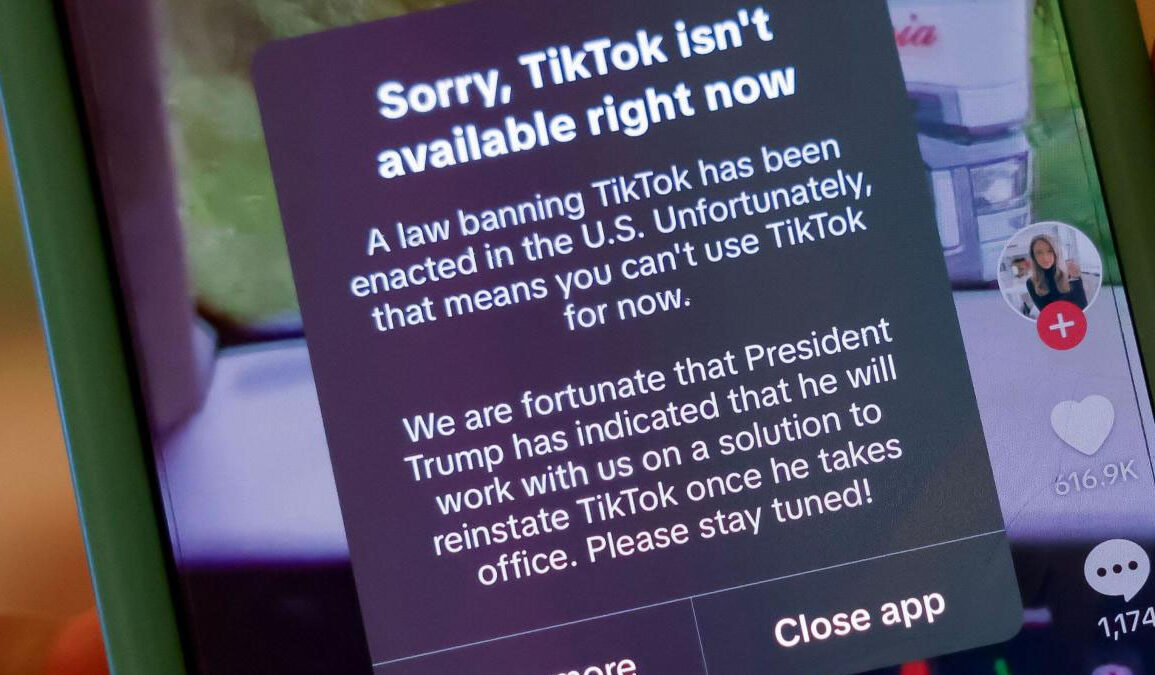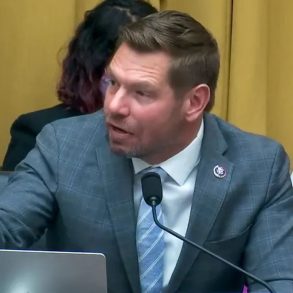Note: Tiktok has resumed service, upon assurances by Trump that they would not be prosecuted.
In a significant move to protect national security, TikTok has gone offline in the United States. The popular social media platform, which boasts 170 million American users, ceased operations after the Biden administration failed to provide clarity on whether it would enforce a federal ban that takes effect today. TikTok’s CEO, Shou Zi Chew, expressed frustration at the lack of assurance, stating, “Statements issued today by both the Biden White House and the Department of Justice have failed to provide the necessary clarity and assurance to the service providers that are integral to maintaining TikTok’s availability to over 170 million Americans.” While this action signals a win against potential foreign threats, the shutdown may only be temporary.
Chew also thanked President-elect Donald Trump for his willingness to work with TikTok, stating, “We deeply appreciate his commitment to work with us to keep TikTok available.” However, the CEO acknowledged the precariousness of the situation, warning that without clear assurances, “TikTok will be forced to go dark on January 19.”
The Legal and Political Background
The Supreme Court’s ruling addressed long-standing concerns about TikTok’s ties to China. The justices determined that the risk to national security outweighed concerns about potential First Amendment violations. Justice Neil Gorsuch, in a concurring opinion, highlighted fears that China could access “vast troves of personal information about tens of millions of Americans.”
The law, passed with overwhelming bipartisan support, requires ByteDance to sell TikTok to a non-Chinese entity or face operational restrictions. White House Press Secretary Karine Jean-Pierre commented, “TikTok should remain available to Americans, but simply under American ownership or other ownership that addresses the national security concerns identified by Congress in developing this law.”
Without the required assurances from the outgoing Biden administration, TikTok preemptively shut down, citing the inability to maintain operations without legal guarantees to its service providers. The Justice Department previously warned that while existing users could still access the app, new downloads and updates would no longer be available, eventually rendering the platform unworkable.
A Crossroads of Technology and Geopolitics
The dispute underscores the growing geopolitical tensions between Washington and Beijing. U.S. officials have long warned that TikTok’s data collection practices pose a national security threat, suggesting that the Chinese government could coerce ByteDance into sharing sensitive user information or manipulating the app’s content algorithm. TikTok has consistently denied these allegations, asserting that there is no evidence of such misuse.
Prominent voices, including Senator Tom Cotton, have been outspoken about TikTok’s risks, referring to it as “a communist spy app.” The Supreme Court’s decision validates these concerns, as it sends a strong message that the U.S. will not tolerate foreign influence through covert data collection or algorithmic manipulation.
At the same time, the Center for Democracy & Technology criticized the decision, with director Kate Ruane stating, “Today’s unprecedented decision upholding the TikTok ban harms the free expression of hundreds of millions of TikTok users in this country and around the world.”
Protecting Americans from Digital Vulnerabilities
While some content creators and small businesses have expressed concerns about the economic impact of TikTok’s shutdown, the broader implications for national security take precedence. Desiree Hill, a small business owner from Georgia, shared her fears: “I’m very, very concerned about what’s going to happen over the next couple of weeks and scared about losing my business in the next six months.”
Justice Sonia Sotomayor noted the challenges of balancing national security with constitutional protections, but the ruling ultimately prioritizes the safety and privacy of American citizens. By shutting down TikTok, even temporarily, the U.S. government has taken a proactive step in curbing a tool that could have been leveraged for nefarious purposes.
The Road Ahead
As President-elect Donald Trump prepares to take office, the next steps for TikTok remain uncertain. Trump, who has expressed a willingness to negotiate a solution, may broker a deal to ensure the platform can operate under non-Chinese ownership. However, efforts to facilitate a sale have been hindered by Chinese regulations restricting the transfer of TikTok’s proprietary algorithm, a key component of its success.
Investors like former Trump Treasury Secretary Steven Mnuchin and billionaire Frank McCourt have expressed interest in acquiring TikTok’s U.S. operations. McCourt’s consortium, which includes “Shark Tank” host Kevin O’Leary, has submitted a proposal but has yet to finalize a deal. Solicitor General Elizabeth Prelogar hinted that enforcing the law might push ByteDance to reconsider its position, stating, “Having the law take effect might be just the jolt ByteDance needs to reconsider its position.”
A Step Toward Digital Sovereignty
TikTok’s shutdown sets a precedent for how the U.S. addresses foreign-owned platforms with potential national security risks. By prioritizing security over convenience, this decision underscores the government’s commitment to protecting its citizens in the digital age.
As the app goes dark, it serves as a powerful reminder of the vigilance required to safeguard personal data and maintain sovereignty in a world increasingly dominated by technology. While the future of TikTok in the U.S. remains uncertain, this action represents a decisive victory in the fight against covert foreign influence.
NP Editor: Now is the time that we will see the backlash and the complaints about how Tiktok was treated “unfairly.” People will forget that it has manipulated public opinion, and povided data to the intelligence services of the Chinese Communist Party.
Ironically, have a look at the companion image to see an example of exactly the kind of influence TikTok is capable of wielding. 170 million users now expect Trump bring back TikTok.








